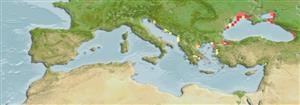Environment: milieu / climate zone / depth range / distribution range
Ecologia
marinhas; Água doce; estuarina demersal; anádromo (Ref. 51243); intervalo de profundidade 30 - 60 m (Ref. 3397). Temperate; 10°C - 20°C (Ref. 2059); 57°N - 36°N, 14°E - 53°E
Europe: Black, Azov, Caspian and Aral Sea, ascending some rivers (Danube up to Bratislava, Volga up to Kazan, Ural up to Chkalov), unknown or very rare in others. On the verge of extinction in its natural range.
Extirpated in Aral basin; nearly extirpated in Black Sea basin; only occasional records from Danube and lower Volga; only a very small population remaining in Rivers Ural (Russia, Kazakhstan) and Rioni (Georgia); no natural spawning population in Iran; established in Lake Balkhash where it forms a large population (Ref. 59043). Artificially propagated (Ref. 6866).
Comprimento de primeira maturação / Tamanho / Peso / Idade
Maturity: Lm ? range ? - ? cm
Max length : 211 cm TL macho/indeterminado; (Ref. 98365); common length : 132 cm TL macho/indeterminado; (Ref. 3397); peso máx. publicado: 80.0 kg (Ref. 52332)
Descrição suscinta
Morfologia | Morfometria
Espinhos dorsais (total): 0; Raios dorsais (total): 45-57; Raios anais : 23 - 37. Snout moderately long and pointed at tip. Lower lip continuous, not interrupted at centre. Barbels halfway between tip of snout and mouth, reaching the latter. Five rows of scutes, dorsal 11-17, lateral 49-70, but usually 55-56 on each side, ventral 10-16, with no smaller plates between dorsal and ventral rows. Color of back grey, flanks lighter, belly white.
Adults occur in the sea close to shores and estuaries and in deep stretches of large rivers over muddy substrate. Are usually solitary. Juveniles live in shallow riverine habitats (Ref. 59043). Feed on mollusks, amphipods and chironomid larvae. Spawning takes place in strong-current habitats in main course of large and deep rivers on stone or gravel bottom (Ref. 59043) from end of April to June (end of May in Rioni River, Black Sea) (Ref. 3193).
Most juveniles move to sea in their first summer and remain there until they reach maturity. Others remain for a longer period. In autumn, individuals migrate to the rivers and remain there until the following spring to spawn (Ref. 59043). Females reproduce every 2-3 and males every 1-2 years (Ref. 59043).
Bauchot, M.-L., 1987. Poissons osseux. p. 891-1421. In W. Fischer, M.L. Bauchot and M. Schneider (eds.) Fiches FAO d'identification pour les besoins de la pêche. (rev. 1). Méditerranée et mer Noire. Zone de pêche 37. Vol. II. Commission des Communautés Européennes and FAO, Rome. (Ref. 3397)
Status na Lista Vermelha da UICN (Ref. 130435)
Ameaça para os humanos
Harmless
Uso pelos humanos
Pescarias: espécies comerciais; Aquacultura: espécies comerciais
Mais informação
ReferênciasAquaculturaPerfil para aquaculturaEstirpesGenéticaElectrophoresesHereditariedadeDoençasProcessamentoNutrientsConversão de massa
Ferramentas
Relatórios especiais
Baixar XML
Fontes da internet
Estimates based on models
Preferred temperature (Ref.
123201): 7.7 - 11.1, mean 10.4 °C (based on 9 cells).
Índice de diversidade filogenética (Ref.
82804): PD
50 = 0.5000 [Uniqueness, from 0.5 = low to 2.0 = high].
Bayesian length-weight: a=0.00575 (0.00355 - 0.00933), b=3.18 (3.05 - 3.31), in cm total length, based on LWR estimates for this species & Genus-body shape (Ref.
93245).
Nível Trófico (Ref.
69278): 3.3 ±0.45 se; based on food items.
Resiliência (Ref.
120179): Baixo, tempo mínimo de duplicação da população 4,5 - 14 anos (K=0.04-0.12; tmax=30; Fec=165,000).
Fishing Vulnerability (Ref.
59153): Very high vulnerability (85 of 100).
